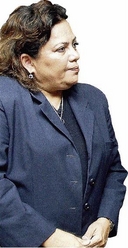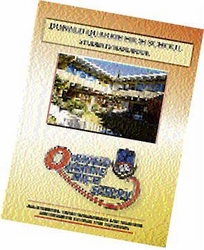PALS gives schools a hand, in writing - Handbook developed for primary, secondary levels
Published: Thursday | October 22, 2009

Janilee Abrikian, general manager of PALS.
Ignorance of the law is no excuse. Cliché, but in the manner of many such pithy, overused statements, true. However, the authorities' obligation to lay out the rules clearly is the other, often unstated, side of the discipline equation.
Peace and Love in Society (PALS) has been working at balancing responsibility with knowledge of the rules in the primary- and high-school systems, developing handbooks that clearly outline a code of conduct for the members of the school's community. So far, several high schools have utilised the PALS handbook templates.
PALS general manager, Janilee Abrikian, told The Gleaner "PALS decided to develop a handbook upon recognising that many schools did not have one, or what they had was inadequate, such as a two-pager. Where those two-pagers did exist, they were also very old and parents and students did not have a copy".
Donald Quarrie's principal, Reford Hines, confirmed that while the school rules were written down previously, using the PALS template provided the school with a comprehensive code of conduct. Hines added that the template was further localised with pictures, the school's vision and mission statements, the school creed, and information regarding the school's valedictory service and awards ceremony being include. And at Donald Quarrie High School, the rules are laid out not only for students, but teachers as well.
While Donald Quarrie introduced its handbook at the start of the current school year, Penwood High is using its PALS template-based handbook for the second academic year. Penwood's principal, Austin Burrell, told The Gleaner that parents and students were required to read the institution's 42-page handbook thoroughly and sign a declaration that they have done so. The declaration reads in part: "I declare my unreserved willingness to abide by the rules and regulations governing the Penwood High School as they are outlined in the handbook."
The handbook template is available to all schools and most of the institutions on the current PALS-Ministry of Education project have shown an active interest in using it to deve-lop their handbooks, or to improve current editions. The PALS programme is being implemented in 90 primary and junior high as well as 15 high schools islandwide in the first phase of a five-year memorandum of understanding between PALS and the Ministry of Education.
The primary and high-school templates differ in some respects, the latter developed first. Abrikian's draft, based on extensive research online as well as existing handbooks in Jamaica, was redefined and 'Jamaicanised' in collaboration with two high-school principals.
Slightly different approach

Abrikian said, "While there is an overlap of issues addressed, the formats of the books are different. Different aspects of school life are addressed, given the different age groups. For example, some time is spent on addressing how parents can help their children with homework in the primary school handbook. This is not addressed in the high school handbook. We also took a slightly different approach to the code of conduct, but this is more of an improvement over the high school handbook."
Although it is clearly stated that the handbook cannot cover every single incident which will arise over an academic year, the templates are detailed and comprehensive. The format includes an introductory section, followed by general information. The policies, regulations and procedures section addresses issues such as cellphone use, sexual conduct, vandalism, health safety and security, visitors and substance abuse. Stakeholder roles - parents, staff, the dean of discipline, the principal - are defined. The student conduct code and discipline plan includes disciplinary action levels and disciplinary options. Outlined is a range of preventive strategies in which the student can be engaged. Where these are not effective, and the student needs additional help with self-management, other measures, such as contracts, special assignments and teacher-parent conferences are suggested. Measures for dealing with more serious and recurring inappropriate student behaviours are also included.
Change for the better
Hines said, at Donald Quarrie, distribution of the handbook had not been going as well as projected as the handbook is available at a cost to families. Starting next year, though, a handbook will be included in the school package of every incoming student. Burrell said students and parents were satisfied with the handbook, which has contributed to a change for the better.
"It's not just the handbook, but also other measures that have been put in place. We have seen an improvement in discipline at the school," Burrell said. Those measures are also largely a result of the PALS programme. He added that, at Penwood, with PALS' guidance, they are also developing a handbook for staff.
As time goes by and the schools' environments change, their handbooks will be a work in progress, with adjustments made as required. Still, it is projected that the PALS-template-based handbooks will serve the schools' needs for a long time.
"We will go back to press in the school year 2011-2012," Hines said.







